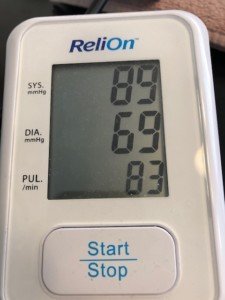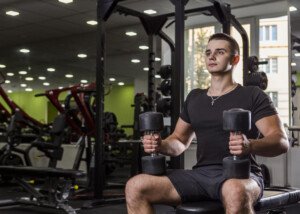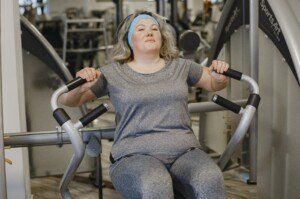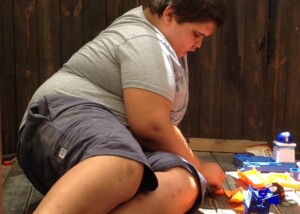Have you read that the life expectancy of Autistics is really low, even for only Level 1 autism?
If you’re worried your autism will cut your life short, you have far more control over this than you think.
I was diagnosed with Autism Spectrum Disorder in the springtime of 2022, in middle age, after nearly a lifetime of structured weight and cardio workouts.
I’ve never taken illegal drugs, smoked, vaped or finished even half a can of beer.
I’m autistic yet am fit enough to compare myself to women half my age.
My systolic blood pressure is often in the 90s! Now that is really good, being that high blood pressure is a major risk factor for heart disease and stroke: two leading killers. And chronic back pain? What the devil is that?

Here is a home blood pressure device showing my blood pressure. As you can see, it’s very calm, which is a good thing for one’s health! Credit: Lorra Garrick
What I’m saying is this: Autism doesn’t prevent exercise, eating healthfully or avoiding toxic substances. And exercise does not require an agile body.
Contrary to myth, an effective exercise program does NOT require funky balance moves or coordinated stepping drills.
So what’s with that frighteningly low number for the average life expectancy of autistic people?
Is an Autistic who faithfully works out, doesn’t smoke or drink, avoids fast food and eats plenty of fruits and vegetables going to die young anyways?
First of all, bear in mind that the low number you came upon might be including Level 3 autism. The inclusion of Level 3 would lower the number.
However, for “high functioning autism,” the average life expectancy may be as low as 58.
But don’t let that scare you. You have the power. You have a choice when it comes to modifiable risk factors for disease and illness.
Autism is not a risk factor for heart disease, cancer, stroke or chronic lower respiratory diseases, which are all top killers.
It’s not a risk factor for other top 10 killers such as diabetes and kidney disease.
So why is the average life expectancy for Level 1 autism only 58?
This can be complicated and multifactorial.
Speculated reasons include reluctance to be seen by a doctor when symptoms arise, plus reluctance for getting even annual wellness checks including for blood work, Pap smears and mammograms.
Colonoscopies (a screening for colon cancer) may be missed due to fear. Even many neurotypicals avoid the colonoscopy.
It could be due to lack of medical insurance, stemming from lack of employment.
There’s actually a whole host of possible explanations.
No health coverage? No gym membership? No problem!
However, there are modifiable risk factors that you can control, even if you don’t have health coverage or a gym membership.
There are things you can do that have been proven to optimize lifespan.
- Avoid alcohol. If you drink, quit.
- Don’t smoke or vape. If you do, quit.
- Do aerobic exercise. This can be done in the privacy of your home if you have a staircase. You can also buy a used treadmill or stationary bike if you don’t want to walk/jog or pedal outdoors.

Walking or jogging outdoors helps clear the mind and reduce anxiety. Shutterstock/DedovStock
You can buddy up with someone, perhaps a fellow Autist from an autism FB group or local autism support, for neighborhood brisk walks or hikes. You can do cardio exercise to DVDs.
If you’re okay with fluorescent lighting you can join a gym. Chain gyms offer cheap packages because this industry is highly competitive.
The pricier clubs include all sorts of amenities which you don’t need to get in shape. Earplugs will work well for the noise.
- Do strength training. This can be done in your own home using bodyweight as well as a cheap collection of implements such as a few pairs of dumbbells, a kettlebell and a set of tension bands. Of course, any gym has a multitude of strength training equipment.
- Practice portion control, even if you eat a lot of processed food. Large quantities of junk or highly processed food cost much more than does portion control of healthy foods.
- Manage your weight. Don’t get brainwashed by influencers who preach that you can be healthy at 240 pounds on a 5’5 frame. Always strive for a healthier weight. Your knees and feet will thank you!
- Do NOT believe for a single moment that just because you’re on the thin side, you don’t need to exercise or eat healthier foods.
Every body needs exercise. Every body needs plenty of fruits and vegetables. And no body needs junk food. If you’re thin, GET OUT THERE AND EXERCISE: with weights and aerobically.

No matter what your fitness level, there’s a pair of dumbbells just the right weight for you. Freepik.com
Autistics Can Do Very Well with Exercise
“I found that exercise was a macroscopic means by which to stim,” says Brad Biren, who was advised by his doctor to regularly exercise to manage some health challenges. Brad is a tax and elder law attorney with a specialty in crisis Medicaid planning, diagnosed with autism at 35.
“Stimming is an important identifying feature of the autistic brain and is characterized by involuntary movement at times exacerbated by anxiety,” continues Brad.
“Regular exercise provided me a near daily supply of stimming in one concentrated dose.
“It helped decrease my overall level of anxiety to a level that made my medications more effective and life with autism more livable.
“Regular exercise [45-60 minute treadmill sessions] has allowed me to better prepare myself for the onslaught of sensory information that reaches my brain every second I am awake.”
Sticking to a workout regimen is based on a routine, and if you’re autistic, you already know how nice it is to have routine and predictability.
You’ll be able to actually stick to an exercise program better than many neurotypicals because your brain is hardwired for routine, order and sameness.
And there’s nothing more routine, orderly and systematic than scheduled, structured workouts!
Rachel Barcellona, 25, makes regular exercise a part of her lifestyle.
“It has helped me as an autistic woman with my balance, since I have balance issues as well,” says Rachel, a model who was diagnosed with ASD at age three.
“When I first started, I couldn’t even do a squat because of the weakness in my muscles, and lifting weights/anything circuit related was hard because of my balance issues.
“Having a fitter body is also beneficial for the autism community too.
“Studies show that we Autistics tend to gravitate towards carbs and other white foods. However, without a great workout, those carbs turn to sugar, which can create fat on your body and lead to diabetes/obesity.”
Jessica Medina, 30, says, “I like focusing on strength training with low level weights because it gives me a sense of control.” She is a licensed marriage and family therapist who was diagnosed with autism at 29. She also does cardio.
“With ASD and our increased arousal states, our cortisol and stress hormones increase significantly — this takes a toll on our cardiovascular systems. By engaging in something that is good for our health, we can keep our heart healthy.”
There’s an exercise quote that I absolutely love: “Deadlift. Because a strong back will support everything else you do in life.”
The deadlift is shown below. Pick up a barbell, keep arms straight, shoulders above hips at all times, rise to straighten your back, then carefully lower the barbell to the floor. Clumsy people can learn to do this.

The deadlift. Shutterstock/Everyonephoto Studio
Are you trying to lose the mask?
Lifelong masking to fit in can be difficult to disengage from. You’ll want to consider the following:
Building a strong, fit body may make efforts to de-mask a lot easier. A strong body can, in a sense, be your new mask.
Fact: A fit, strong body does wonders for the self-worth and self-confidence of neurotypicals, so it stands to reason that it would provide these same benefits for Autistics.
A Barbell Can’t Tell an Autistic from a Neurotypical
Lifting weights – whether you’re a man or a woman – has been proven in MANY studies to dramatically improve numerous metrics of health.
No matter what your age or current fitness level, whether you’re “weak skinny” or “slow fat,” whether you’re klutzy or not, it does not matter.
And a barbell, dumbbell or weight machine cannot tell the difference between a neurotypical user and an autistic user.
There’s no “autism setting” on a weight machine. Just sit in it and begin pushing or pulling!

The seated chest press. Pexels, Gustavo Fring
Autism Doesn’t Have to Shorten Your Life
Here’s what DOES shorten life expectancy — in a very direct way:
- Smoking
- Obesity
- Junk food diet, even if you’re thin
- Absence of consistent, structured exercise. In fact, the American Heart Association says that people who engage in 150 to 600 minutes of exercise a week had the lowest risk of premature death from any cause — according to a very large study over 30 years.
So if you’re worried about your autism shortening your lifespan … it’s time to take control and get into the routine of a structured workout regimen and improved eating habits.
 Brad Biren, Esq, LL.M, specializes in assisting individuals with special needs and diverse talents who are overcoming sudden adversity. He utilizes his inspiring tale of overcoming unexpected adversity to help motivate others in the community to pursue their goals.
Brad Biren, Esq, LL.M, specializes in assisting individuals with special needs and diverse talents who are overcoming sudden adversity. He utilizes his inspiring tale of overcoming unexpected adversity to help motivate others in the community to pursue their goals.
 Rachel Barcellona currently serves as a board member for C.A.R.D. USF, Unicorn Children’s Foundation, Els for Autism Center of Excellence, Dyspraxia Foundation USA, and works with The Global Autism Project, Doug Flutie Jr. Foundation for Autism and Victoria’s Voice Foundation. The Unicorn Children’s Foundation has raised $250,000 for families who don’t have money for the necessary therapies/resources for their children.
Rachel Barcellona currently serves as a board member for C.A.R.D. USF, Unicorn Children’s Foundation, Els for Autism Center of Excellence, Dyspraxia Foundation USA, and works with The Global Autism Project, Doug Flutie Jr. Foundation for Autism and Victoria’s Voice Foundation. The Unicorn Children’s Foundation has raised $250,000 for families who don’t have money for the necessary therapies/resources for their children.
 Jessica Medina is a licensed marriage and family therapist (#129383) who specializes in “geek therapy” and making therapy fun, engaging and a safe place to comfortably explore emotions. Her superpower is making geek and pop culture (e.g., Marvel, Disney, videogames) therapeutic. TikTok/Instagram: @happylilbrains
Jessica Medina is a licensed marriage and family therapist (#129383) who specializes in “geek therapy” and making therapy fun, engaging and a safe place to comfortably explore emotions. Her superpower is making geek and pop culture (e.g., Marvel, Disney, videogames) therapeutic. TikTok/Instagram: @happylilbrains
 Lorra Garrick has been covering medical and fitness topics for many years, having written thousands of articles for print magazines and websites, including as a ghostwriter. She’s also a former ACE-certified personal trainer. In 2022 she received a diagnosis of Level 1 Autism Spectrum Disorder.
Lorra Garrick has been covering medical and fitness topics for many years, having written thousands of articles for print magazines and websites, including as a ghostwriter. She’s also a former ACE-certified personal trainer. In 2022 she received a diagnosis of Level 1 Autism Spectrum Disorder.
.
Top image: ©Lorra Garrick










































